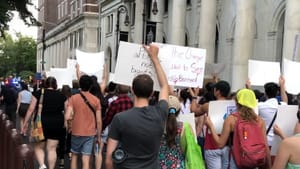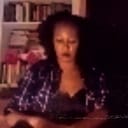Stay in the Loop
BSR publishes on a weekly schedule, with an email newsletter every Wednesday and Thursday morning. There’s no paywall, and subscribing is always free.
Local artists speak
A look back: why the Philly theater scene needs the Black Lives Matter movement

On the anniversary of George Floyd’s murder, in a pandemic world that can no longer ignore police violence, exclude our LGBTQ+ family, or avoid acknowledging how many of us experience some type of bias—from Asian people to Black people to those of Jewish or Muslim faith to those with visible or invisible disabilities—I wanted to know if things are improving in the Philly theater community.
Throughout 2019 I saw a lot of complaints, concerns, and passionate statements on social media where individuals spoke to their experiences and called for change. Protestors who flooded Philly streets in 2020 on behalf of racial equality catalyzed even more overdue discussions in real life and on Philly theater Facebook groups about performer safety, sexual harassment, casting diversity, LGBTQ+ inclusiveness, fair pay, and balanced representation in all avenues (onstage and backstage talent, directorial board, managerial positions, and administrative staff).
In this new world of Black Lives Matter awareness, have theater administrators improved their organizations’ diversity policies? Do artists feel safe, represented, and acknowledged? This three-part BSR series will examine the Philly theater scene in the recent past (before widespread Black Lives Matter awareness), the present (what planning is happening around these issues?), and the future (tangible implementations). In interviews with Philly artists, whose presence I noted through social media, I asked them to identify what they felt were key past concerns in the Philadelphia theater community.
On representation
Talking with me via phone, Jenna Pinchbeck, a founder of Protect the Artist (PTA), accurately stated that “theater in Philadelphia does not look like the City of Philadelphia.” She pointed to the city’s racial demographics, including Black residents who made up more than 42 percent of the population in 2020.
“A lot of amazing, incredible, and talented Black artists, Asian artists, trans artists, Latino artists ... all live here, but they leave because they’re not given opportunities." Among PTA actions targeting the Walnut Street Theatre, she requested the Walnut sign the Broadway Advocacy Coalition pledge because she felt the theater does not “hire enough marginalized voices.”
Davon Williams, a former Walnut teaching artist, told me that when his loyalty to the theater was tested, his work was “dismissed … because of who I was and what I looked like,” and he “was very much reminded I was Black.”
But diverse representation is not limited to race. Among the 60 Walnut-related testimonies that Pinchbeck stated the PTA received in 24 hours after opening a survey for local artists, one person revealed that artistic director Bernard Havard touched the artist’s head "looking for the mark of the Jew." And although Williams noted homophobic statements are not specific to the Philly industry, he says a regional casting director told him "we're not trying to put gay people in straight roles.” Comedian Kat Mosley, co-host of The Leak podcast, told me via Zoom that it’s “hard to avoid places where owners used transphobic words.”
In 2020, Paul Meshejian, then the artistic director of PlayPenn, faced criticism for applying an extreme colorblind casting policy to the workshop readings of all scripts, including those written by and for people of color. According to the Philly Inquirer, when playwrights insisted on accurate cultural casting, Dan O’Neil, the casting director at the time, claimed diverse actors were difficult to find. In 2020, as reported in American Theatre, Black creators believed PlayPenn lost the diversity represented in its 2017 conference compared with 2020 offerings, and play-selection panel members who were people of color felt PlayPenn ignored their suggestions.
On safety
Quinton Alexander, casting director for the Philly queer musical collaborative troupe Hum’n’Bards, told me that safety is a key concern: "If people don't feel safe in the space, they're not gonna want to work with you, especially people from marginalized groups."
In July 2020, in the Philly Theatre Facebook group, playwright Sarah Mantell, whom I followed up with via email, detailed sexual assault she says she experienced from Victor Keen, a former PlayPenn board member (later also discussed in the aforementioned American Theatre piece). Although she privately reported the issue to Meshejian in 2014, it was overlooked (but fast forward six years: two weeks after Mantell made the incident public, a law firm PlayPenn hired to investigate allegations of sexual harassment contacted her).
In my interview with Mosley, she revealed safety concerns can come from audience members or colleagues. During recent performances, she said “a woman didn't try to attack me physically but did a bunch of screaming and … people could've kept a better eye on her ... she kept finding a way into my space. I just don't think [the venue] got maybe we need security.” Additionally, a white male colleague claimed she misunderstood his joke using the N-word. Meanwhile, at the Walnut, those submitting their experiences to PTA said that Havard entered women’s dressing rooms without knocking.
On fair pay
When asked about primary issues on the Philly theater scene, Williams listed “fair pay, budget transparency,” and “unionization.” He initially worked for the Walnut Street Theatre through its contract with a regional talent center of the City of Philadelphia. He said that when the City stepped back from its Walnut contract, his liaison hired him directly and offered to maintain what she thought was his going rate: $350 per class. The Walnut had paid him $150. That discrepancy helped him to realize “I’m not getting paid what [the City] assumed.”
He pointed out that most school-based teaching artists were people of color and tended to get “disenfranchised.” In a similar vein, Mosley admitted she felt a lack of transparency regarding payment at the Philly Improv Theater (PHIT) when it hosted her comedy show For My People.
On listening
I myself spent a lot of time taking classes and auditioning at the currently inactive PHIT. Although I personally knew and had no difficulties with PHIT owner Greg Maughan, there was a revolving door of diversity directors and limited casting diversity. Daralyse Lyons, improviser and author of Demystifying Diversity: Embracing Our Shared Humanity (as well as several BSR pieces) told me via Facebook messenger that despite good intentions, Maughan was “HIGHLY inequitable in his treatment of women, POC and nonbinary folx.”
Mosley similarly states that she "had so much difficulty on PHIT." And in a non-public Facebook post shared widely within the community, a former PHIT cast member said their 2017 show sold out three times in a row, but they never received payment. The ongoing issues came to a head in 2020, when the We the People improv festival organizers (originally under the PHIT umbrella) felt that PHIT leaders weren’t listening and eventually separated from PHIT.
At the time, the group posted a public message stating, “We’re aware of the concerns of some of the members of the community and, at this time, we feel that in order to honor and respect those concerns, it is best for us to continue as an independent entity.”
Going on the record?
Considering past concerns listed above surrounding diversity, safety, fair pay, and communication, has the Philly theater scene improved? Well... despite the abundant source material, I still experienced initial difficulty identifying sources for this article. Despite the amount of people speaking passionately and somewhat publicly a year ago on social media, few were willing to go on record in 2021. Some were traumatized by past experiences. Others were concerned about legal issues or being ostracized. Although I posted in a limited number of groups, I heard back only from people marginalized for their gender, sexuality, or race. No cisgender white men initiated contact, or were willing to go on record, when reached, about incidents they witnessed.
It makes me wonder: if those who were victimized (or were not victimized, but claim allyship) are unwilling to speak, will things change? Can they change?
Sign up for our newsletter
All of the week's new articles, all in one place. Sign up for the free weekly BSR newsletters, and don't miss a conversation.

 An Nichols
An Nichols